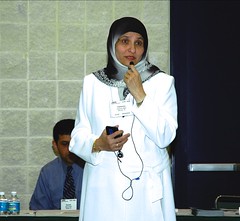Sunday, 10 April 2011
Defining Islamic Education: Differentiation and Applications
Abstract
This article explores use of several terms that signify Islam, and provides guidelines to
clarify their use in internal and external discourses. Building on this foundation, the
article delineates a typology of Islamic education and their associated institutions. This
enhances understanding of important conceptual differences that hinge upon subtle
variations of language as in the distinction between education of Muslims and for
Muslims, and between teaching Islam and teaching about Islam. Introduction
The political, economic and social effects of globalization are varied, but they certainly
are indicative of our attempt as human beings to define and understand our place in the
world. As regions and cultures come into contact with one another, it is often difficult
for people to recognize parallel ideas, values, and institutions in other societies. It is
much easier to recognize differences and to imagine that they represent an unbridgeable
distance from what is familiar. Despite trends towards global interdependence,
seemingly inexorable differences continue to be underlined among regions and groups
through the use of signifiers that create distance. "Islamic" is a term that has been used
as one such signifier. In particular, the word has often served as an adjective in everyday
speech that neatly partitions off familiar terms from normalcy and transforms them into
unreachable, alien concepts.
Within discourse about Islam and Muslims in the United States and abroad, the term,
Islamic, is attached to a wide range of phenomena. Muslims use the term to refer to what
relates to Islamic teachings or institutions, but Muslims and non-Muslims alike
frequently use the adjective, Islamic, to elevate cultural expressions to the position of
normative or consummate institutions or practices. Poorly nuanced use of the term,
Islamic, among public commentators often fails to make any distinction between that
which pertains directly to Islam and its doctrines, and actions its adherents perform in
the cultural or social realm. Thus terms used to signify Islam and Muslims lack precision
when used by both Muslims and others in public discourse.The article then seeks to
elucidate a theoretical conception of "Islamic education," that takes into consideration
Islamic scripture and Prophetic statements, along with commonly-held approaches to
education in Muslim history. The article concludes that key motivations and
characteristics of a holistic and purposeful education program are shared between
Islamic and Western traditions, a phenomenon partially explained by the shared and
cumulative transmission of educational values and methods from classical times until
the present.
Subscribe to:
Post Comments (Atom)

No comments:
Post a Comment